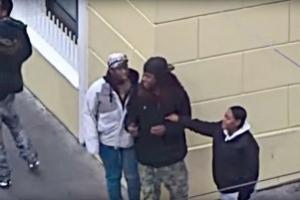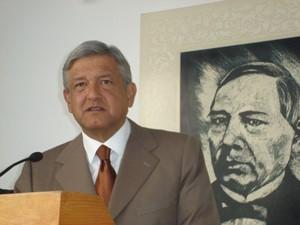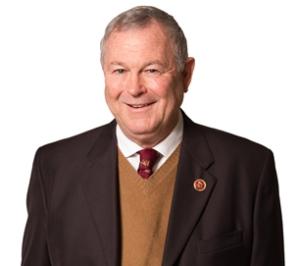The city by the bay has been a hotbed of illegal race-based policing. This is just the latest example.
Smoking and vaping dominate the market.
A Florida cop gets nailed peddling pain pills from his patrol car, a Texas cop goes down for trying to peddle stolen cocaine, and jail guards go wild (again).
A new Pew poll shows continuing majority support for marijuana legalization, Mexico's president-elect talks legalizing opium production for medicine, Texas's governor gets behind reducing pot penalties, and more.
Efforts to establish safe injection sites in Philadelphia and San Francisco hit some bumps in the road, President Trump calls for "stop and frisk" policing in Chicago, and more.
The FDA is seeking public comment on marijuana classification, Mississippi cops continue to seize cash and other goods despite a change in state law that should have stopped them, and more.
The US has clarified that Canadiana marijuana workers and investors can enter the US but not for that business, New Jersey's governor says a vote on legalization will happen before month's end, Pennsylvania's former governor sticks up for safe injection sites, and more.
Rep. Dana Rohrabacher (R-CA) says the president will move on marijuana policy after the election, the Supreme Court will hear an important asset forfeiture case later this year, thousands more drug defendants will see drug charges dismissed in the Massachusetts drug lab scandal, and more.
San Francisco's Tenderloin is a heavily populated, racially mixed neighborhood in the heart of one of America's iconic progressive cities. Yet when the San Francisco Police Department and the DEA targeted the neighborhood to crack down on drug dealing between 2013 and 2015 as part of "Operation Safe Schools," the only people they managed to roll up were black.

hustling in the Tenderloin (SFPD surveillance video screen grab)
When 37 black defendants -- and no defendants of any other race -- got hauled away, nobody noticed. That is until the defendants started showing up looking for federal public defenders. The federal public defenders noticed, and they began making noise about racial disparities and selective enforcement of the drug laws.
Their charges only grew louder with the posting in 2015 of undercover police surveillance video to YouTube revealing a police officer muttering "fucking BMs," police code for black males, as he monitored a group of young men on the street. The video also apparently showed an undercover informant turning down drugs being offered by an Asian woman to instead buy drugs from a black woman.
In January 2017, 12 of those charged in the operation won a discovery motion from a judge who found there was "substantial evidence suggestive of racially selective enforcement" in their arrests. Instead of allowing the proceedings to continue so a full accounting of police conduct could occur, prosecutors instead dropped the charges.
At the time, the presiding judge, US District Court Judge Edward Chen, made clear that while he was granting the dismissals because they were in the best interest of the defendants, he was concerned that doing so would prevent the allegations of police bias from being aired.
"These are serious issues, serious allegations regarding claims of discriminatory enforcement patterns," Chen said. "I think the defendants in this case have raised a very substantial prima facie case that, at the very least, raises some serious questions that would warrant a response and a full airing of the issues."
Now, a year and a half later, the ACLU of Northern California on Thursday filed a federal civil lawsuit on behalf of six of those rolled up in the busts. The lawsuit alleges the plaintiffs were targeted because of their race and cites a survey of Tenderloin drug users to bolster its case. That survey found racial diversity among Tenderloin drug sellers. About half were black, but 20 percent were Latino and 17 percent were white.
The lawsuit is "an opportunity to hold the actors in the San Francisco Police Department and the city itself accountable for the police department's longstanding practices of engaging in racially discriminatory law enforcement," said ACLU attorney Novella Coleman, who is representing the plaintiffs.
It's also about financial relief for the plaintiffs, Coleman allowed. "The court will determine how to monetize that," she said.
Not an Anomaly
Racially biased policing is nothing new in San Francisco. In fact, as Ezekiel Edwards, director of the national ACLU's Criminal Law Reform Project, pointed out in a post announcing the lawsuit, the city has the dubious honor of setting precedent for the idea that law enforcement targeting people based on their race is unconstitutional. In an 1886 case, Yick Wo v. Hopkins, the city attempted to deny laundry permits to Chinese people while granting them to non-Chinese. Such an action could only be explained by the city's "hostility to the race and nationality" of the applicants, a violation of the 14th Amendment's guarantee of equal protection under the law.
Fast forward to the 21st century, and the evidence that the city's penchant for targeting non-whites for harsher treatment remains intact just keeps piling up. Numerous studies in the past few years have documented racially biased policing practices, including a 2002 ACLU report on SFPD racial profiling and a city-commissioned study by a national expert on biased policing.
Those studies uncovered a range of bias-related problems and made concrete recommendations for reform. Those were ignored. As the rotten policing practices festered, more reports detailing racial and ethnic disparities across the criminal justice system came out in 2013 and 2015.
Then, in 2015, as "Operation Safe Schools" was winding down, SFPD was hit by a new scandal when officers were caught exchanging racist text messages. Some used the N-word, others referenced cross burnings. Officers were caught calling black residents "savages," "wild animals," and "barbarians," and one officer told his sergeant "All n[ -- ] must fucking hang." Another officer sent a text with an image of a white man spraying a black child with a hose above the caption "Go be a n -- somewhere else."
That finally got the attention of city fathers -- as well as the Obama-era Justice Department. The city district attorney convened a Blue Ribbon Panel on Transparency, Accountability, and Fairness in Law Enforcement that documented SFPD's history of racially disparate enforcement and concluded that it was "in urgent need of important reforms." In 2016, the Justice Department weighed in with its own report finding that the department still engaged in racially biased policing, especially around traffic stops and police use of deadly force.
It's Not Just San Francisco
The ACLU's Edwards concisely makes the case that San Francisco is no exception when it comes to racially biased policing:
"Unequal treatment by race is commonplace among police departments large and small in cities across a range of ideological leanings. This is the reason for the racial profiling lawsuits filed in New York City, Chicago, Philadelphia, and Maricopa County, Arizona. This is the motivation, prior to Attorney General Jeff Sessions, for Justice Department consent decrees seeking to end racially discriminatory police practices in Seattle, Los Angeles County, New Orleans, Baltimore, Newark, East Haven CT and Ferguson MO. This is why the ACLU has found racial disparities in marijuana possession arrests across the country, in drug possession arrests more broadly, in stops and frisks in Boston, in seatbelt enforcement in Florida, and in arrests for low-level offenses in Minneapolis."
When will things ever change?
This article was produced by Drug Reporter, a project of the Independent Media Institute.
back to top
The stereotypical picture of marijuana consumption is someone toking up buds in a joint or bong, but as weed comes out from the shadows and into the legal marketplace, entrepreneurs are busily concocting all sorts of pot products. From vape pens to concentrates to edibles, drinks, tinctures, and even creams and topical lotions, marijuana is now available in myriad forms.
But what's the most popular? Here, we turn to the good folks at BDS Analytics, a company that prides itself on providing "data-driven insights, market intelligence, and complete consumer understanding" of the marijuana industry. BDS has just released its list of
the Top 10 ways people are consuming cannabis in 2018, based on results from its proprietary GreenEdge™ Retail Sales Tracking database, which gathered data from California, Colorado, and Oregon from the first half of the year.
The biggest takeaway is that despite all the hoopla about the multitude of new marijuana products, people still overwhelmingly favor inhaling their weed, either as smoke from buds or via vaping. Sales of buds, pre-rolled joints, vape cartridges, and disposable vapes accounted for around $1.8 billion in sales, with another $200 million coming in sales of concentrates, which are typically also inhaled. And it was buds (flowers) that made up more than half of that figure.
Edible and tincture products that made it into the Top 10 only accounted for about $200 million in sales, or about 10 percent of the total pot market in those three states. While edibles and other cannabis concoctions may be the wave of the future, as of now, bud is still the king.
Here are BDS Analytics' Top 10 pot products, based on total retail sales:
1. Flower: This shouldn't be a surprise to anyone. We all had joints, bowls and bongs long before we could easily buy weed-infused kombuchas. Good old flower was there first, and it remains on top. Sales: $1.1 billion.
2. Vape cartridges: This category only looks at vapes and vape-accessories that come with cannabis and are sold in dispensaries -- not the pot-free vaporizers you can buy online. And they are extremely popular -- rising all the way to No. 2 in our list. Sales: $476 million.
3. Pre-rolled joints: Forms of inhalation claim all of the top 3 ways people take their weed. Pre-rolls include plain flower, and those that are "infused" with concentrates. To keep things simple, we just looked at the broad joint category, including infused. Sales: $185.5 million.
4. Gummies: People who like eating their ganja are especially fond of the sweet and sour and chewy treats. Way to represent, gummies! Sales: $135 million.
5. Dropper: Bet you didn't guess droppers would round-out the top 5, did you? Not long ago, they didn't. But droppers' popularity has been spiking for several years, and now they represent one of the most popular forms of cannabis consumption: fill the dropper with a dose, squirt it into your mouth, and savor the flavors, which often involve things like tropical fruits and berries (along with cannabis). Sales: $68 million.
6. Shatter: This stiff, glass-like form of concentrate, which often gets inhaled after it is heated on a dab rig, was a popular form of concentrate from the beginning -- in fact, when Colorado first began legal adult-use sales in 2014 it was the second-most popular kind of concentrate in the state for the year, behind wax. Back then, vape was a minor category. But now, shatter is second only to vape in the concentrates race to supremacy. Sales: $64 million.
7. Wax: It's a bit of a sibling rivalry, the jockeying for second place that takes place between shatter and wax, which is pliable compared to stiff shatter. The two routinely trade the No. 2 spot, among concentrates. Sales: $63 million.
8. Live Resin: … Sales: $61 million.
9. Disposable vapes: As we know, vape pens are extraordinarily popular with cannabis consumers, and most people buy cartridges (No. 2 on this list) which they fit into their pens when the previous cartridge's oil is all gone. But some vape pens come pre-filled with cannabis oil, and are tossed when the oil runs out -- no option for just plugging a new cartridge of oil into the pen. Sales: $56 million.
Rounding-out the Top 10 we have another edible. Chocolate bars were the No. 1 way of eating weed back when adult-use sales were first made legal; in Colorado, during 2014, chocolate bars grabbed 20 percent of the edibles market, compared to 17 percent for gummies. But trends have changed dramatically. Still, chocolate squeaked into the Top 10. Sweet! Sales: $39 million.
This article was produced by Drug Reporter, a project of the Independent Media Institute.
back to top
A Florida cop gets nailed peddling pain pills from his patrol car, a Texas cop goes down for trying to peddle stolen cocaine, and jail guards go wild (again). Let's get to it:
In Northampton, North Carolina,
a county jail guard was arrested last Friday after drugs were found in his lunchbox. Detention Officer Douglas Squire, 51, was arrested after officers sweeping the jail for contraband discovered a Schedule II substance in the lunchbox. He is charged with felony possession of controlled substances on jail premises.
In Trio, Georgia, a Hays State Prison guard was arrested last Friday on charges that he sneaked drugs, alcohol, cellphones, and glass pipes into the prison. Guard Mark Edward Jeffery went down after a fellow guard found a mysterious taped rectangle inside Jeffery's beverage container. When a supervisor opened the package, he found a glass pipe, four smartphones, four phone charges, about 190 ecstasy pills and a plastic bag with methamphetamine. It's not clear what exact charges Jeffery faces.
In Burlington, Vermont, a Northern State Correctional Facility guard was arrested last Saturday for allegedly using magic markers to hide drugs he smuggled into the prison. Corrections Officer Greg Vance and an inmate are charged with conspiracy to introduce contraband into the prison. The drug in question was buprenorphine, used to treat opioid dependence.
In Bonafay, Florida, a Bonafay police officer was arrested Monday for selling opioids out of the back of his patrol car. Officer Dwayne Frazier White came under scrutiny last month, and Florida Department of Law Enforcement agents then made a controlled purchase of opioid tablets from White's patrol vehicle while he was in uniform. White was last reported being held at the Walton County Jail. It's not clear what the official charges are.
In Weslaco, Texas, a former Edcouch police officer was sentenced last Wednesday to three years in federal prison for stealing 15 bundles of cocaine from a drug seizure. Vicente Salinas pleaded guilty to conspiracy to possess with intent to distribute over 500 grams of cocaine.
back to top
A new Pew poll shows continuing majority support for marijuana legalization, Mexico's president-elect talks legalizing opium production for the medical market, Texas's governor gets behind reducing pot penalties, and more.

Mexican President-Elect Andres Lopez Manuel Obrador is talking about legalizing opium production again. (Creative Commons)
New Pew Poll Has Continued Strong Support for Marijuana Legalization. More than six out of 10 Americans (62%) say marijuana should be legalized, according to a new Pew Research Center survey. That's largely unchanged from last year when the figure was 61%. Among Democrats, 69% support legalization; among independents, the figure is 75%, but only 45% of Republicans support it.
Texas Governor Proposes Lessening Possession Punishments. Gov. Greg Abbott (R) announced last Friday that he favors dropping the maximum penalty for marijuana possession from six months in jail to a fine and no jail time. Such a move would not be decriminalization, though, because possession would remain a misdemeanor, although a less serious one.
International
Ireland Should Decriminalize Drugs, Report Says. A new report from the Ana Liffey Project and the London School of Economics says treating people caught with small amounts of drugs as criminals is "counter-productive". Instead, the report says, such offenses should be decriminalized. "The evidence is pretty clear that decriminalization is the smarter way to deal with this issue, that you shouldn't be giving young people, or anyone for that matter, criminal records for possessing certain substances or consuming certain substances," said Dr. John Collins from the London School of Economics International Drug Policy Unit. "That, ultimately, is just an ineffective way and an ineffective use of police resources."
United Kingdom to Allow Medical Marijuana by Prescription Starting Next Month. Beginning next month, people in the UK will be able to obtain cannabis oil containing THC through prescriptions. The Home Office will reportedly announce the rescheduling of marijuana in parliament within the next two weeks, and patients will be able to obtain prescriptions within a matter of weeks after that.
Mexico President-Elect Says He Will Look at Legalizing Some Drugs. President-Elect Andres Manuel Lopez Obrador said Sunday he would consider legalizing certain drugs as part of a broader strategy to fight crime and poverty. He also said he would consider paying farmers more for their corn as a means of reducing the planting of opium.
Mexico Defense Minister Says Legalizing Opium for Medical Use a "Way Out" of Violence. Defense Minister General Salvador Cienfuegos said last Friday that legalizing opium for medicinal use could help reduce violence among drug gangs fighting over control of poppy fields and trafficking routes in the country's southwest. Legalization "is already on the table. I think it can be a way out of the problem," Cienfuegos said when asked about violence in the state and proposals to regulate opium production.
back to top
Efforts to establish safe injection sites in Philadelphia and San Francisco hit some bumps in the road, President Trump calls for "stop and frisk" policing in Chicago, and more.

President Trump calls for "stop and frisk" policing in Chicago -- after the city agreed to stop it. (Creative Commons)
Pennsylvania Governor Rejects Philadelphia Safe Injection Site Proposal. Even though Philadelphia officials are moving ahead with plans for a safe injection site, having formed a nonprofit last week to oversee the project, Gov. Tom Wolf (D) is not behind the plan. "It's not a workable solution to this problem," he said. "The course that I think we ought to take, and what I'm doing at the state level, is to figure out ways to get people to stop wanting to use those drugs. I would not want to be guilty of spending any public money to give people the sense that this is something that's OK. I just don't think that's a good idea." He and Democratic Attorney General Josh Shapiro worry about conflicting with a 1986 law, the federal "crack house" law that bars the use of a facility "for the purpose of manufacturing, distributing, or using any controlled substance."
San Francisco Mayor Still Weighing Safe Injection Sites, Despite Veto of State Bill. Mayor London Breed (D) is now pondering the city's way forward with a safe injection site after Gov. Jerry Brown (D) last week vetoed a bill that would have put the state of California fully behind the effort. Breed is said to be concerned about threats of possible federal prosecution if the plan moves toward fruition.
Law Enforcement
President Trump Calls for Police "Stop and Frisk" Tactics in Chicago. Speaking to the International Association of Police Chiefs in Orlando Monday, President Trump called on Chicago police to embrace "stop and frisk" policing as a tool to reduce violence in the country's third-largest city. "Stop and frisk" was embraced for years by the New York City police department, but was widely criticized as overwhelmingly aimed at minority populations and ultimately ruled unconstitutional as carried out by the NYPD. "Gotta be properly applied, but stop-and-frisk works," said Trump. The city of Chicago reached an agreement with the American Civil Liberties Union of Illinois in 2015 to curb stop-and-frisk procedures after the ACLU threatened to file a lawsuit over the issue. A spokesman for Mayor Rahm Emanuel (D) blasted Trump for his "clueless" criticism. "Even someone as clueless as Donald Trump has to know stop-and-frisk is simply not the solution to crime," Matt McGrath said in an emailed statement.
International
Bangladesh Moving to Impose Death Penalty for as Little as Five Grams of Meth. The cabinet has approved in principle a draft of the Narcotics Control Act of 2018 that introduces the death penalty for anyone producing, smuggling, distributing, or using more than five grams of methamphetamine. The draft also sets life in prison as the mandatory minimum sentence for such offenses. Less than five grams of meth would merit a sentence of up to 15 years, with a mandatory minimum of five years. The new law also would mandate the death penalty for more than 25 grams of heroin or cocaine.
back to top
The FDA is seeking public comment on marijuana classification, Mississippi cops continue to seize cash and other goods despite a change in state law that should have stopped them, and more.

No marijuana-infused gummies for you, Washington staters! (Creative Commons)
Trump Administration Seeks Public Comments On Marijuana Reclassification. The Food and Drug Administration (FDA) is seeking public comment about "the abuse potential, actual abuse, medical usefulness, trafficking, and impact of scheduling changes on availability for medical use" of cannabis and several other substances now under international review. Marijuana is currently Schedule I under US law and international anti-drug treaties. Public comments "will be considered in preparing a response from the United States to the World Health Organization (WHO) regarding the abuse liability and diversion of these drugs," Leslie Kux, FDA's associate commissioner for policy, wrote in a Federal Register filing published on Wednesday. "WHO will use this information to consider whether to recommend that certain international restrictions be placed on these drugs."
Pennsylvania Marijuana Decriminalization Bill Wins Committee Vote. A bill to decriminalize the possession of up to 30 grams of marijuana, House Bill 928, was approved in the House Judiciary Committee Tuesday. Under current state law, possession is a third-degree misdemeanor punishable by up to 30 days in jail and a driver's license suspension. The bill now heads for a House floor vote.
Philadelphia Mayor Again Calls for Marijuana Legalization. Philadelphia Mayor Jim Kenney said once again on Tuesday that Pennsylvania should legalize the recreational use of marijuana statewide. "Legalizing cannabis is the right thing to do for the commonwealth," Kenney said as he announced the 2018 Cannabis Opportunity Conference next weekend. "We don't need to be wasting precious resources locking people up for marijuana possession when we should be focused on improving our schools and other priorities."
Washington State Regulators Move to Ban Marijuana Gummies and Hard Candies. The state Liquor and Cannabis Control Board announced last week it would reverse its earlier approval of marijuana-laced gummies and hard candies because they are "especially appealing to children." The board told pot companies that "all production of hard candy, tarts, fruit chews, colorful chocolates, jellies, and any gummy type products should cease" because they will no longer be approved for sale under new regulations that go into effect January 1, 2019. Stores can sell such products through April 3, 2019, or until existing inventory is depleted.
Asset Forfeiture
Mississippi Police Ignore New State Law, Keep Seizing Property. Police agencies in the state have continued to seize cash, guns, and vehicles under a state law that lapsed on June 30. That law allowed police to seize up to $20,000 in property associated with illegal drugs. Now, Mississippi agencies must sue in court and get a judge to approve seizures, as they already were required to do with larger amounts, but state police agencies have made at least 60 seizures since then without obtaining prior judicial approval.
back to top
The US has clarified that Canadiana marijuana workers and investors can enter the US but not engage in business here, New Jersey's governor says a vote on marijuana legalization will happen before month's end, Pennsylvania's former governor sticks up for safe injection sites, and more.

New Jersey Gov. Phil Murphy says legislature should vote on legalization October 29. (Creative Commons)
California Governor Signs Bill Banning CBD Cocktails and Beverages. Gov. Jerry Brown (D) has signed into law Assembly Bill 2914, which prohibits the sale of CBD beverages and alcoholic drinks. "This bill would prohibit an alcoholic beverage licensee from, at its licensed premises, selling, offering, or providing cannabis or cannabis products, including an alcoholic beverage that contains cannabis or cannabis products, and would provide that no alcoholic beverage shall be manufactured, sold, or offered for sale if it contains tetrahydrocannabinol or cannabinoids, regardless of source," says a legislative summary.
New Jersey Governor Says Legalization Coming at End of Month. Gov. Phil Murphy (D) says he and the legislature are looking at October 29 as the date the legislature will pass a bill legalizing marijuana. One issue yet to be settled, though, is how much to tax legal pot. Still, Murphy said, October 29 "feels about right."
Drug Testing
Pennsylvania Representative Proposes Bill to Add Drug Testing of Legislators to Bill to Drug Test Welfare Recipients. Philadelphia County Rep. Angel Cruz (D) has filed House Bill 620 as an amendment to Senate Bill 6. The Senate bill would mandate drug testing of welfare recipients; Cruz's bill would mandate drug testing of legislators. "If it's good for one, it's good for all," said Cruz. "The lawmakers are the lawmakers, and we're not above the law."
Foreign Policy
US Clarifies Policy on Entry of Canadian Marijuana Industry Workers. US Customs and Border Protection (CBP) has clarified its position on whether Canadians involved in the legal marijuana industry can enter the US. "A Canadian citizen working in or facilitating the proliferation of the legal marijuana industry in Canada, coming to the US for reasons unrelated to the marijuana industry will generally be admissible to the US," CBP said Tuesday. But there is a big but: "[I]f a traveler is found to be coming to the US for reason related to the marijuana industry, they may be deemed inadmissible," CBD said.
Harm Reduction
Former Pennsylvania Governor Challenges DOJ on Threats to Prosecute Safe Injection Site Operators. Former Gov. Ed Rendell (D) is not backing away from supporting a Philadelphia safe injection site despite threats from Justice Department Deputy Attorney General Rod Rosenstein. Rendell sits on the board of a nonprofit to run such a facility, and he said that if the Justice Department wants to crack down on the harm reduction move, it should start with him: "I have a message for Mr. Rosenstein: I'm the incorporator of the safe injection site nonprofit and they can come and arrest me first," Rendell said.
back to top
Rep. Dana Rohrabacher (R-CA) says the president will move on marijuana policy after the election, the Supreme Court will hear an important asset forfeiture case later this year, thousands more drug defendants will see drug charges dismissed in the Massachusetts drug lab scandal, and more.

Rep. Dana Rohrabcher (R-CA) says the Trump administration will move on marijuana policy after the election. (house.gov)
Trump Plans To Back Legal Medical Marijuana After Midterms, GOP Congressman Says. In an interview with Fox Business on Thursday, Rep. Dana Rohrabacher (R-CA) said that he had been talking with people inside the White House about ending marijuana prohibition. Rohrabacher added that he's been "reassured that the president intends on keeping his campaign promise" to protect state marijuana policies from federal interference. He didn't point to any specific legislation but said details would begin to take shape after the election. "I would expect after the election we will sit down and we'll start hammering out something that is specific and real," he said. "It could be as early as spring of 2019, but definitely in the next legislative session," he said.
Asset Forfeiture
Supreme Court to Hear Asset Forfeiture Case Later This Year. The US Supreme Court is set to hear oral arguments in an important asset forfeiture case on November 28. The case is Timbs (and a 2012 Land Rover) v. Indiana, in which Tyson Timbs appeals the seizure of his vehicle after he was arrested for selling heroin to undercover police officers. Timbs bought the vehicle with proceeds from his late father's life insurance policy -- not drug profits -- and argues that seizing the vehicle amounts to a violation of the 8th Amendment's ban on excessive fines. A state appeals court had overturned the seizure, calling it "grossly disproportional," but the state Supreme Court vacated that decision on the grounds the ban on excessive fines does not apply to the states.
Criminal Justice
Massachusetts High Court Orders Dismissal of Thousands of Cases in Drug Lab Chemist Scandal. The state's Supreme Judicial Court on Thursday ordered the dismissal of thousands of additional drug convictions due to the misconduct of Amherst drug lab chemist Sonja Farak, some dating back as far as 2004. "We conclude that Farak's widespread evidence tampering has compromised the integrity of thousands of drug convictions apart from those the Commonwealth has agreed should be vacated and dismissed," wrote Justice Frank Gaziano in the court's 61-page unanimous decision. "Her misconduct, compounded by prosecutorial misconduct, requires that this court exercise its superintendence authority and vacate and dismiss all criminal convictions tainted by government wrongdoing." Farak has pleaded guilty to stealing drug samples to feed her addiction. State prosecutors had already agreed to dismiss some 8,000 cases. Now there will be thousands more, though an exact number is not immediately available.
International
Colombia Coca Farmers Protest Against Forced Crop Eradication. Coca-growing peasants set up roadblocks on Thursday to protest against the forced eradication of coca crops and fumigation measures. The farmers in several municipalities of Norte de Santander are demanding to be included in the program of crop substitution so they have an alternative to growing coca. Farmers in Cucuta and El Zulia blocked two main local highways. They are members of the National Coordination of Cultivators of Coca, Poppy and Marijuana and the Campesino Association of Catatumbo.
back to top







